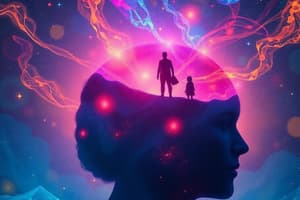Podcast
Questions and Answers
What distinguishes voluntary acts from involuntary acts?
What distinguishes voluntary acts from involuntary acts?
Voluntary acts are performed with awareness and intentionality, while involuntary acts occur without conscious decision or awareness.
How do free will and determinism differ in their views on human actions?
How do free will and determinism differ in their views on human actions?
Free will posits that individuals can make independent choices, whereas determinism asserts that actions are influenced by external factors or pre-existing conditions.
Explain the ethical implications of moral responsibility related to voluntary acts.
Explain the ethical implications of moral responsibility related to voluntary acts.
Moral responsibility means individuals are accountable for the consequences of their voluntary acts, which can lead to ethical considerations and judgments.
What role do psychological factors play in influencing acts of men?
What role do psychological factors play in influencing acts of men?
How does existentialism view individual freedom in relation to acts of men?
How does existentialism view individual freedom in relation to acts of men?
Study Notes
Acts of Men
Definition
- Acts of men refer to the actions, behaviors, and decisions made by individuals, reflecting human agency and responsibility.
Categories of Acts
-
Voluntary Acts
- Actions taken with awareness and intentionality.
- Example: Choosing to help a friend.
-
Involuntary Acts
- Actions performed without conscious decision or awareness.
- Example: Reflex actions, such as jerking away from pain.
-
Free Will vs. Determinism
- Free Will: The belief that individuals have the power to make choices.
- Determinism: The theory that actions are determined by external factors or pre-existing conditions.
Ethical Dimensions
- Moral Responsibility: Individuals are accountable for their voluntary acts, which can have ethical implications.
- Legal Responsibility: Actions may be subject to legal consequences based on societal norms and laws.
Influencing Factors
- Psychological Factors: Emotions, beliefs, and mental states that affect decision-making.
- Environmental Factors: Social, cultural, and physical contexts that shape behavior.
- Biological Factors: Genetic predispositions and neurological influences on behavior.
Philosophical Perspectives
- Existentialism: Emphasizes individual freedom and the importance of personal choice.
- Utilitarianism: Evaluates acts based on the consequences for overall happiness or utility.
Conclusion
- Understanding acts of men involves examining the interplay between intention, morality, and external influences on human behavior.
Acts of Men
- Acts of men are actions, decisions, and behaviors made by individuals, reflecting their agency and responsibility.
- Voluntary acts are done with awareness and intention.
- Involuntary acts are done without conscious choice or awareness.
- Free will suggests individuals can make choices, while determinism posits actions are predetermined by external factors.
- Moral responsibility stems from the choices people make.
- Legal responsibility is imposed by society's laws and norms.
- Psychological factors, such as emotions and beliefs, influence decisions.
- Environmental factors shape behavior through social and cultural contexts.
- Biological factors like genetics can affect behavior.
- Existentialism emphasizes individual freedom and choice.
- Utilitarianism assesses actions based on their consequences for overall happiness or utility.
Studying That Suits You
Use AI to generate personalized quizzes and flashcards to suit your learning preferences.
Description
This quiz explores the concept of human actions, distinguishing between voluntary and involuntary acts. Delve into the implications of free will versus determinism, along with the ethical and legal dimensions of our decisions. Test your understanding of how psychological factors influence our behavior.




